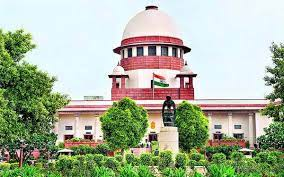CURRENT AFFAIRS
Get the most updated and recent current affair content on Padhaikaro.com
SC on Death Penalty
- Vaid's ICS, Lucknow
- 12, Feb 2022

Why in News?
- Favouring the anti-death penalty cause, SC said that judges across the country must look at the mitigating factors in favour of life imprisonment, rather than prescribing the death penalty with an eye only on the abhorrence of the crime.
Background
- The case involved the rape and murder of a 7-year old girl. Both the lower courts (including High Court) had given intense remarks about the crime, before sentencing him to the death penalty.
- However, SC commuted the death penalty to life imprisonment, taking into account the mitigating factors in favour of the accused.
Death Penalty
- Stance of the Supreme Court:
- Rarest of the Rare Doctrine: SC has previously ruled against frequently awarding the death penalty. In the Bacchan Singh case (1979), SC said that it must only be awarded in rarest of the rare cases, which shook the collective conscience of society, and only if it serves the other societal causes.
- Preservation of Life: In the current case, SC observed that penology has evolved to accommodate the philosophy of ‘preservation of human life’.
- Mitigating circumstances: SC has said the courts must equally consider other factors that can help the prisoner keep his life. For e.g., courts must give equal weightage to factors like the criminal record, conduct of an accused during jail term, aging father, a young family etc.
- Use of other Options: SC also said that in case of heinous crimes, courts can use other midway approaches like awarding life imprisonment without remission or premature release. A delicate balancing of the judicial process is needed in cases involving heinous crimes.
Other arguments against Death Penalty:
- Severity and Irrevocability: It is important to consider that once a death penalty is executed, there is no possibility of backtracking or retrial of an accused. This might leave a scar on the judicial system in case of later discovery of contradicting evidence.
- Disparity in Morality and Education: Indian society is still far from realizing the dream of an equal society. Therefore, merit needs to be given to the case of people who were not raised in a suitable environment and were unable to instill appropriate ideas in their conscience.
- Collaboration with data: As per National Crime Records Bureau (NCRB), the murder rate in India has declined from 4.6 per lakh in 1992 to 2.7 in 2013. This decline has coincided with a corresponding decline in the rate of executions, thus raising questions on the effectiveness of the death penalty.
Arguments in favor of Death Penalty:
- Deterrent: SC has said that death punishment serves as a deterrent and a “response to the society’s call for appropriate punishment in appropriate cases”.
- Recommendations of Law Commission: In the 35th Report of Law Commission of India (1962), which was presented in 1967, the Law Commission favoured retaining the death penalty in the Indian Judicial System. It said that maintenance of law and order, absence of any empirical research and other similar factors, “India cannot risk the experiment of abolition of capital punishment”.
- Local Factors: Despite the global trend of the abolition of capital punishment, the Law Commission has stressed that “arguments which are valid in one area of the world may not hold good in respect of another area”. Therefore, there is a requirement for further discussion on the topic before finally abolishing capital punishment from the Indian legal system.
Way Forward
- Institutional Inertia: Both the Law Commission as well as Supreme Court have ruled in favour of continuing the death penalty. However, SC has advocated following the Rarest of the Rare Doctrine to award capital punishment in only the most heinous crimes.
- Mitigating Circumstances: There are reports of award of the death penalty to accused who are less than 18 years of age, who are mentally or intellectually disabled or are awarded the death penalty after unfair trials. This goes against the very substance of legal jurisprudence and is unacceptable.
- Reform-centric Approach: There is a need to shift the focus from a punishment-centric approach to a reform-centric approach so that instead of being hardened, there is hope for a criminal to return and get absorbed in society.
Facts for Prelims :
International Labour Organisation (ILO):
- Established as an agency for the League of Nations following World War I.
- Established by the Treaty of Versailles in 1919.
- It became the first specialised agency of the United Nations (UN) in the year 1946.
- It got the Nobel Peace Prize in 1969.
- It is the only tripartite U.N. agency. It brings together governments, employers and workers.
- Headquarters: Geneva, Switzerland.